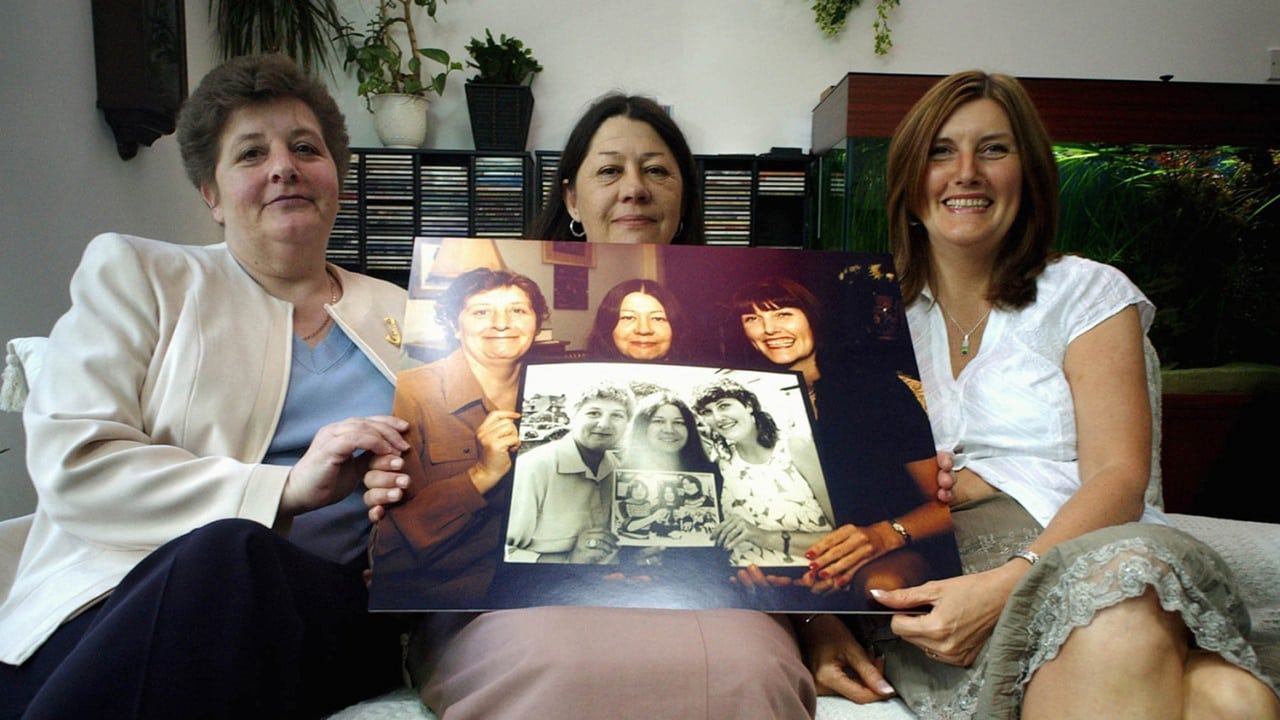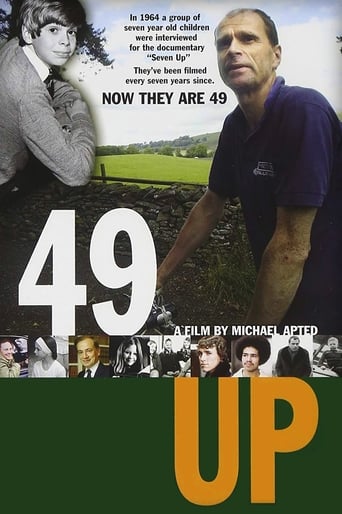

I think this is a new genre that they're all sort of working their way through it and haven't got all the kinks worked out yet but it's a genre that works for me.
... View MoreGood idea lost in the noise
... View MoreAs somebody who had not heard any of this before, it became a curious phenomenon to sit and watch a film and slowly have the realities begin to click into place.
... View MoreThe movie really just wants to entertain people.
... View MoreIt all started with the thought-provoking "Seven Up", from a very socially loaded channel, and was meant to showcase the shift between children from upper and lower classes and how their future would be conditioned by their background. LikeApted pointed out in his wonderful chat with Roger Ebert, it's only after the "21" episode that it stopped being about politics, but something of a more existential level.But each episode has its charm, a charm that depends on personal memories and age, whether a viewer is younger or older than these kids or guys will create a totally different experience, but no age will ever diminish its value, because we can all relate to any of their struggle or doubts or exhilaration as youngsters, their period of doubts and questioning as adults.And in my recent review, I complained that the format felt a bit repetitive but that was because the documentary was made for TV at a time where a few viewers had access to the previous episodes, the editing was indispensable and this is why I waited a little before watching "49".But I couldn't wait for too long because I also love the real time travel the film provides and as a viewer told Apted, he could watch all the episodes in one day and it was like a metaphysical experience. I believe so and I understand why Ebert put it in his Top 10 movies of all time, it IS an experience, but now I feel like a broken record because I kept praising the documentary. I think this 7th episode is perhaps the best (which is appropriate, right?). I loved it because it was nicely conclusive about the subjects, without meaning it was the end of the journey, but they all seemed happy or at least contented.As usual, it starts with the most contented of all, Tony. Tony is perhaps the best thing about the documentary, I used to say Nick because he was the eternal question mark and a sort of cliffhanger, but Tony defied the odds... Apted admitted he thought he'd had the makings of a criminal, Tony's evolution proved him to never take anything for granted. Basically, Tony did everything, he was a jockey, at least he tried, his job as a cab driver allowed him to buy a house, he took acting courses, had small TV roles. And now, we see him leaving Britain for Spain, because, as he says, the East Side has totally changed, and became too ethnic for his own liking, as he admits it honestly, he feels like a traditionalist. Was I angry at him? No. Did I think it was racist? No. That's the key of the film, I have followed this kid from the start and I could get his point precisely because I followed his evolution and the way Britain evolved. Now, Tony thinks he's paid enough wages, lives in Spain and predicts a collapse of the economy... for someone who never studied, he showcases a real astute thinking. It is even more troubling that John, one of the posh kids, agrees with him indirectly. His conservative views were in-character but I didn't mind because I was glad he was participating this time, for some reason, I've always regarded him as one of the show's most instantly recognizable faces, because he really knows how to occupy the screen, he's a snob but quite a scene stealer. He's still indecisive about politics, if he had half Tony's spirit, he'd have been Prime Minister. Some others were less ambitious and are just enjoying the time they had with their family and spouses and it was a nice touch to show Paul and Simon reuniting after 28 years, they both have changed, less hair, more weight (who didn't?) but the eyes don't lie, they still have that sparkle and that smile. Suzie was there, too and smiling as usual, saddened by the fact that her children left the house empty. It is possible that we wouldn't see her in the next episode because she felt she came to a closure. I don't know if I would take her words too seriously, if there's one thing I've learned from "Up" is that you should never say never. But there was more in that episode than the usual vignettes on each others' lives, the tone has changed too.I noticed how more confident they all speak to Apted, Apted is 15 years older than them, which doesn't mean much now. There is an extraordinary exchange with Jackie where she finally opened her feelings about a nasty question Apted asked in the "21" and how bad she felt about it, smelling some preconceived ideas about lower class girls, she held quite a grudge against him. It took almost three decades to settle that record and you can tell that some people need time to finally vent their feelings, well, time is the one luxury the documentary can afford. And I guess Apted might have regretted his bold question from the start, but he's supposed to evolve as well, he's the last subject of the documentary. He also evolved in the making, the digital format allowing him to get more footage, but since he didn't want to fall in a trap of contextualization, he avoided asking timely questions because their lives spoke enough statements.. Tony mocked the posh kids at the age of seven, together would almost share the same views in 2005, that says a lot. As for the ones I didn't mention, Neil is still unmarried but is a more eloquent politician, he doesn't see Bruce anymore, Bruce has children, better late than never, Nick went through a divorce but remarried, it's all about ups and downs but the thrills of life is to find in the downs the sources... of "Ups".
... View MoreI watched Ebert's interview with Apted on the DVD, and I noticed that Ebert's love for the series seems almost entirely about the concept of the thing as a whole. He rarely mentions specific moments or elements of the individual films that excite him. Yes, it is a "noble" endeavor, and one that I'm glad exists, but really, the films on their own are mostly pretty dull. Here we have everything settling into middle age, and most of them quite comfortably. Good for them, but what's in it for me? I don't really need to hear about the mundane professions your kids have taken up, or that you love your grandchildren (I kind of figured you did). It's somewhat rewarding to know that these folk have found some degree of contentment, it just doesn't make for compelling filmmaking. I could read about it in a Wikipedia article or something and have the same results. The one really interesting thing going on in this installment is that it seems to get a bit more meta. Several of the subjects address their involvement in the film, some with a measure of resentment or frustration (and maybe I'm mistaken, but I think we hear more of Apted's voice as well). These were the most rewarding parts for me.
... View MoreThis is not a social science film and it's not exactly an art film either. But neither is it just another version of Big Brother. I personally found this unique project profoundly moving in its originality. Through this film we get a deep sense of the way humans adjust to their circumstances, maintain their personalities and shape their own lives around what they want and can have. I had a sense of the innate decency of most human beings, our capacity for love and survival, the way in which character runs deeper than circumstances, but also the strong effect that circumstances such as the class one is born into can have on us. Most of all I was touched by the unpredictability of life: it would have been hard to say whose marriages would last and whose would not, for example.Having said that, it is unclear to me why so many of the subjects, who volunteer to take part in the filming, seem to fear and oppose it so much. As someone who would have loved the opportunity to revisit my own life at different stages, I have a hard time understanding the reasons for their reluctance and even hostility.
... View More"49 Up" (2005), co-produced and directed by Michael Apted, is the seventh episode of a unique venture in film-making. Apted began filming a group of children at age seven, and has followed and filmed their lives every seven years since then.For us, as spectators, following the progress of the lives of these children has been fascinating. However, the children themselves, who are now well into middle age, don't appear to be very happy with themselves or with the project.I have two questions about this. In the first place, why are these people so angry at Michael Apted? (We never see Apted, but the individuals confront him, and we hear his answers to their comments.) Naturally, it's hard to know what Apted puts into his films, and what he leaves out. However, as far as I can tell, he's fair and objective in what he shows us. The characters in the movies certainly don't like the films, and most of them don't like Apted. One person, while conceding that being in the film helped him raise money for his favorite charity, refers to the process as the poison pill that he swallows every seven years. The United Kingdom has a population of about 60 million people. That means that these people had roughly a two in a million chance to be chosen for the project. No one else in England--even the Queen--is scrutinized in quite this way. Why aren't they happy to leave a record of their lives?The second question is, If they hate the project so much, why do they continue to participate? (I don't know if they are paid--that's never been made clear.) In any event, they certainly don't have any legal, moral, or ethical obligation to allow Apted to film them. They could just tell him that they're finished with the project. Why don't they? (Some have, but most return every seven years.)I had a thought about this after seeing 49 Up. This time, I found the film pretty depressing. Naturally, some people were happier than others, but no one appeared to be really satisfied with his or her life. Could it be that something about being filmed every seven years has altered the trajectory of the lives of these people? Maybe they think they would have been happier if they had never heard about Apted's project. Maybe they're wrong, but maybe they're right.
... View More